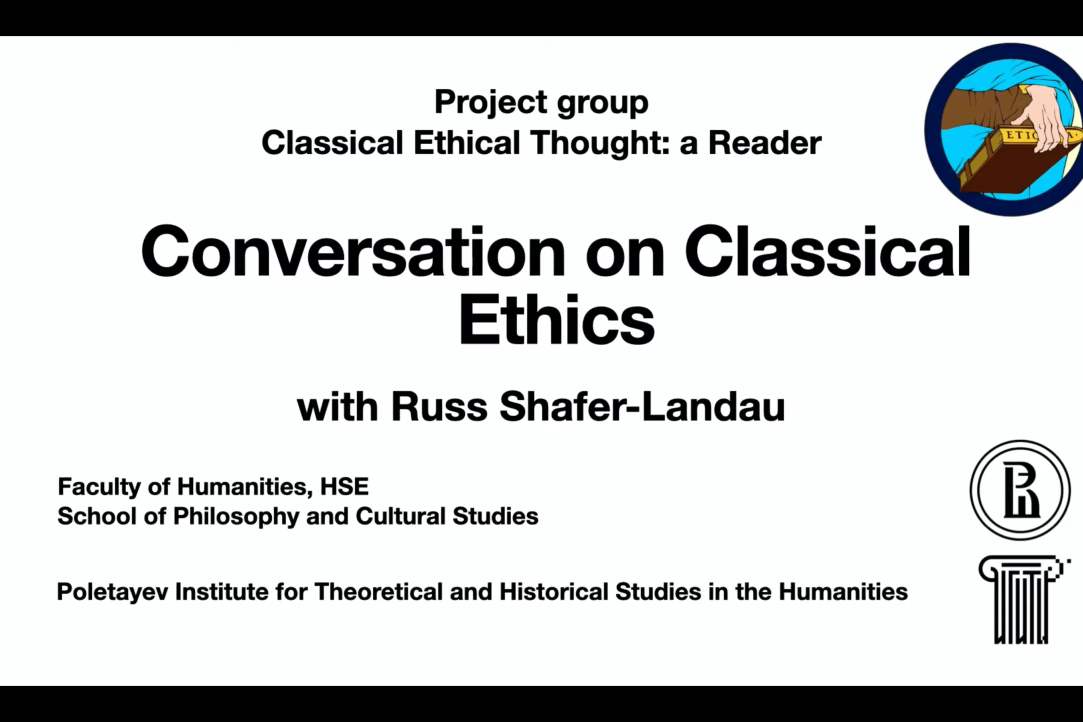Первая встреча в рамках цикла "Conversations on Classical Ethics": разговор с профессором Шейфером-Ландау

Серия Conversations on Classical Ethics стартовала 19 февраля. К нашей группе присоединился Расс Шейфер-Ландау, профессор Висконсинского университета в Мэдисоне (США), один из ведущих специалистов в мире в области метаэтики, редактор влиятельнейшей серии Оксфордских исследований по метаэтике. Профессор Шейфер-Ландау, кроме прочего, оказал значительное влияние на преподавание этики в университетах всего мира: его антологии «Ethical Theory» (Blackwell 2012), «The Ethical Life: Fundamental Readings in Ethics and Moral Problems» (Oxford University Press 2020) неоднократно переиздавались и используются преподавателями и исследователями по всему миру. Это направление работы профессора Шейфера-Ландау стало одним из ключевых ориентиров для нашего собственного проекта.
Участники проекта обсудили с профессором Шейфером-Ландау вопросы, связанные с проблемой канона и классикализации в этике, ролью классики этической мысли в современном мире, местом этики в университете.
Мероприятие прошло онлайн в закрытом формате. Видеозапись можно посмотреть на сайте проектной группы (в разделе "Conversations on Classical Ethics") и на Youtube-канале ИГИТИ.
***
Ethics and Classics
The philosophical canon has often been questioned over the last years, resulting in the addition of new authors to the traditional lists (e.g., female philosophers). What works do we call classical, and who do we call the classics? How this questioning affects the field of ethics? Were there any explicit theoretical factors that led to changes in the selection of texts for your Ethical Theory's subsequent editions? Were there any substantial shifts in students' interest or any contemporary discussions that had some influence on it? In the preface to Ethical Theory, you acknowledge that the range of texts would be even broader had there been no publishing limits. What texts or sections would you add to the current edition if there were no material constraints? Or, maybe, you would exclude some authors in further editions?
Ethics and the Modern World
Today's public discussion of ethics includes more or less 'new' topics, such as harassment, cancel culture, language reforms (grammatical gender — a discussion of feminine vs. masculine nouns and pronouns), affirmative action, BLM, etc. In Russian media-discourse, an umbrella term 'new ethics' emerged to describe all these phenomena as some coherent movement (quite often, it is used pejoratively, as something that threatens 'traditional' values and 'traditional' morality). Do you think this is a valid term, or could it be useful? How are these 'new' topics related to classical ethical thought? And, regardless of the topic du jour, why is it important to read classical texts and classical authors at all?
Ethics and University
In contemporary universities, the 'economic reason' plays a dominant role: if something is economically inefficient, it is ruled out. But the very university ethos seems to heir some inefficient elements: knowledge demands time, leisure, and unpractical interests (due to the etymology of Greek scholē). What role does ethics play in the contemporary university, as you see it? And what role do you think it should have? Should we introduce something like a required course of ethics in the core curriculum for all students regardless of specialization? Another dimension is the relationship with the administration. What do you think about universities' ethical codes or codes of conduct (in Russia, with the legacy of the Soviet past, it is often considered by the professorate as an instrument of pressure)? Can universities put restrictions on their members' statements in the public sphere for the university's sake as a corporation?
